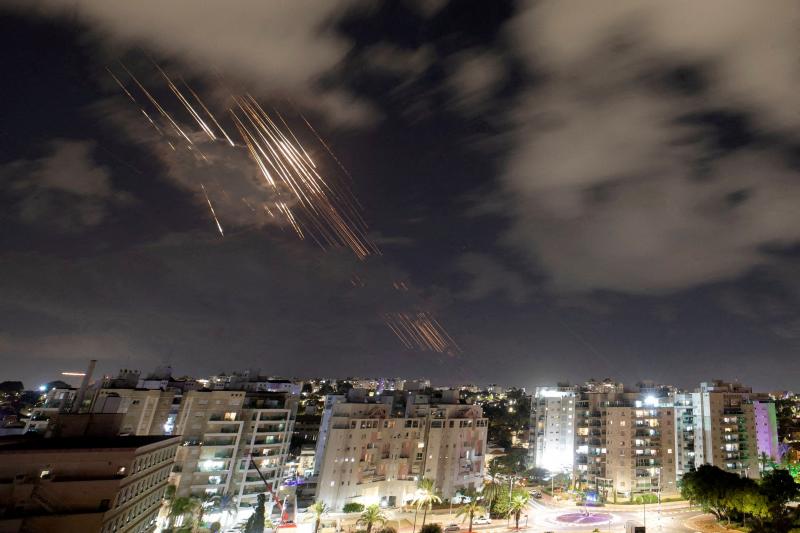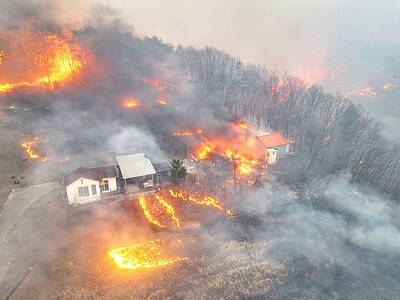Iran's missile barrage this month against Israel, after a similar large-scale attack in April, shows the value, as well as the shortcomings, of US and allied missile defenses in a potential Indo-Pacific conflict with China, analysts say.
Although differences between the two scenarios limit the lessons that can be learned, the nearly 400 missiles of different types that Iran has fired at Israel this year offer the US and China some idea of what works and what does not.
For Washington, the main takeaway from Iran's Oct. 1 attacks — the largest sample yet of ballistic missiles fired against modern defenses — could be that Beijing's missiles would be more difficult to intercept than Iran's and that the ability to strike back would be needed to deter a mass attack, said Collin Koh of the S. Rajaratnam School of International Studies in Singapore.

Photo: Reuters
"If we look purely through the lenses of deterrence, no longer can one pin hopes on deterrence by denial only — that is, the hope that effective defenses can blunt the efficacy of missile strikes," Koh said. "Deterrence by punishment might have to become normative going forward."
There is no immediate threat of missile conflict in the Indo-Pacific region. The distances, thousands of kilometers, are greater than in the Middle East.
China's weapons are more advanced, including maneuvering warheads and precision guidance. Also, the target areas are scattered across the region, making a massed attack more difficult.
China's military launched a new round of war games near Taiwan today, saying it was a warning to the "separatist acts of Taiwan independence forces."
A Taiwan security source said there were no signs so far of any missile launches.
The US has developed and deployed new weapons in the region this year to counter China, including the AIM-174B air-to-air missile and the ground-based Typhon missile battery in the Philippines, which can launch SM-6 and Tomahawk missiles.
The US Indo-Pacific Command and Chinese Ministry of Defense did not immediately respond to requests for comment.
On the other hand, simply being better informed about how offensive and defensive systems perform after Iran's missile fusillades — many were intercepted — may reduce the chance of conflict, Ankit Panda of the US-based Carnegie Endowment for International Peace said.
"Any military force planning long-range missile strikes will need to plan around the possible effects of missile defenses," Panda said. "Of course, without clarity on how well a given missile defense system might perform, this could lead to massive escalation."
Israel's layered air and missile defenses — from its long-range Arrow systems to the Iron Dome shield meant to handle slower, less complex threats — are tailored to the threats it faces: guided ballistic missiles from powers such as Iran mixed with unguided rockets launched from just over Israel's borders.
The picture is much different in the Indo-Pacific region for the US and its allies, which use the Lockheed Martin, opens new tab and Raytheon, opens new tab Patriot, Terminal High Altitude Area Defense and sea-based Aegis systems for missile defense.
The accuracy of China's DF-26, its most numerous conventional intermediate-range ballistic missile, is estimated to be as good as 150m, according to the Center for Strategic and International Studies' Missile Defense Project.
Its DF-21 is shorter-ranged, although some variants have an accuracy of 50m.
Both can hit most US and allied targets in the region. The DF-26 can reach Guam, the site of major US military facilities.
The Pentagon has estimated that China may have several hundred of the missiles.
By contrast, Iran's missiles such as the Fattah-1 are theoretically more accurate — within 10s of meters — but are much shorter-ranged.
The number of these newer missiles is not public, but US Air Force General Kenneth McKenzie told Congress last year that Iran had more than 3,000 ballistic missiles of all types.
China's capabilities outstrip Iran's in other ways, said Malcolm Davis, a senior analyst at the Australian Strategic Policy Institute.
Missile attacks would most likely be coordinated with anti-satellite strikes and cyberwarfare, both designed to complicate defense.
"Western [integrated air and missile defense] systems in the Indo-Pacific would have a much tougher time defeating a large Chinese missile strike, comprising hundreds or even thousands of missiles, compared to what the Iranians are capable of," Davis said.

DEATH CONSTANTLY LOOMING: Decades of detention took a major toll on Iwao Hakamada’s mental health, his lawyers describing him as ‘living in a world of fantasy’ A Japanese man wrongly convicted of murder who was the world’s longest-serving death row inmate has been awarded US$1.44 million in compensation, an official said yesterday. The payout represents ¥12,500 (US$83) for each day of the more than four decades that Iwao Hakamada spent in detention, most of it on death row when each day could have been his last. It is a record for compensation of this kind, Japanese media said. The former boxer, now 89, was exonerated last year of a 1966 quadruple murder after a tireless campaign by his sister and others. The case sparked scrutiny of the justice system in

The head of Shin Bet, Israel’s domestic intelligence agency, was sacked yesterday, days after Israeli Prime Minister Benjamin Netanyahu said he no longer trusts him, and fallout from a report on the Oct. 7, 2023, Hamas attack. “The Government unanimously approved Prime Minister Benjamin Netanyahu’s proposal to end ISA Director Ronen Bar’s term of office,” a statement said. He is to leave his post when his successor is appointed by April 10 at the latest, the statement said. Netanyahu on Sunday cited an “ongoing lack of trust” as the reason for moving to dismiss Bar, who joined the agency in 1993. Bar, meant to

DITCH TACTICS: Kenyan officers were on their way to rescue Haitian police stuck in a ditch suspected to have been deliberately dug by Haitian gang members A Kenyan policeman deployed in Haiti has gone missing after violent gangs attacked a group of officers on a rescue mission, a UN-backed multinational security mission said in a statement yesterday. The Kenyan officers on Tuesday were on their way to rescue Haitian police stuck in a ditch “suspected to have been deliberately dug by gangs,” the statement said, adding that “specialized teams have been deployed” to search for the missing officer. Local media outlets in Haiti reported that the officer had been killed and videos of a lifeless man clothed in Kenyan uniform were shared on social media. Gang violence has left

‘HUMAN NEGLIGENCE’: The fire is believed to have been caused by someone who was visiting an ancestral grave and accidentally started the blaze, the acting president said Deadly wildfires in South Korea worsened overnight, officials said yesterday, as dry, windy weather hampered efforts to contain one of the nation’s worst-ever fire outbreaks. More than a dozen different blazes broke out over the weekend, with Acting South Korean Interior and Safety Minister Ko Ki-dong reporting thousands of hectares burned and four people killed. “The wildfires have so far affected about 14,694 hectares, with damage continuing to grow,” Ko said. The extent of damage would make the fires collectively the third-largest in South Korea’s history. The largest was an April 2000 blaze that scorched 23,913 hectares across the east coast. More than 3,000